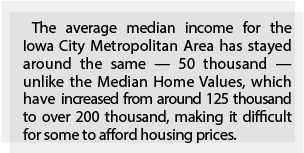Housing prices in Iowa City have increased over the years, and reaching the goal of affordable housing is a challenge.
By Naomi Hofferber | [email protected]
The complex and multifaceted issue of making housing affordable in Iowa City is not one that can be easily solved.
Housing and Equity in Iowa City, a City Council report in 2016, showed that while median income for Iowa City residents has remained steady since 1990, the median home values have steadily increased.
“The problem with Iowa City’s housing prices is that there is such a high demand that comes from the university in terms of faculty, staff, and the students in the downtown area,” said Jacob Simpson, the University of Iowa Student Government City Council liaison. “I think it’s fair to say that housing prices are too high, and if we focused on developing higher density buildings, we would see housing prices decrease as supply of housing increases.”
Redeveloping around the UI and downtown is difficult, because developers have to pay more for rebuilding than they would for developing on vacant land. However, this land is also some of the most valuable, because it is closest to campus.
“Rezoning won’t affect a lot of the properties by the university because it’s already built out, so unless the developer is willing to buy out existing building, pay any businesses in that building, demolish it, and rebuild much higher — that’s expensive,” said Tracy Hightshoe, the city Neighborhood Services coordinator. “You don’t see that very often. If we increase supply, then the rent for everyone will go down. But students want to live … close to the University of Iowa, most of them. You have a location like that, and the demand is so heavy.”

Zoning and rezoning areas in the city is an additional way that the city can potentially encourage development, but it is not always a popular idea.
“People may be for affordable housing in principle, but when it comes to locating affordable housing in their neighborhood, there’s always a pushback,” Hightshoe said. “Neighborhood resistance is a huge issue, especially the idea of rezoning.”
Zoning places specific criteria for buildings to meet. Some zoning protects historical housing, which prevents redevelopment. When open land is available, the cost of land and of construction can prevent the development of affordable housing.
“When you want to provide housing at below market prices, you usually have to subsidize it, and that money has to come from somewhere,” Hightshoe said.
Sally Scott, the executive director of the Johnson County Affordable Housing Coalition, believes that making housing more affordable cannot fall solely on the city.
“It’s really got to be the city in partnership with nonprofit developers, for-profit developers … I think the city has recognized it’s not possible for the city alone to address this issue, though it plays a really important part,” Scott said. “There’s this sense that developers are the bad guys, that they’re just building higher-cost housing, but it’s actually really challenging for developers to build something that’s affordable.”



